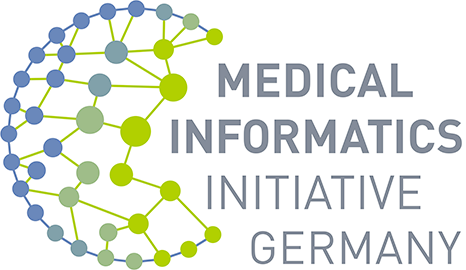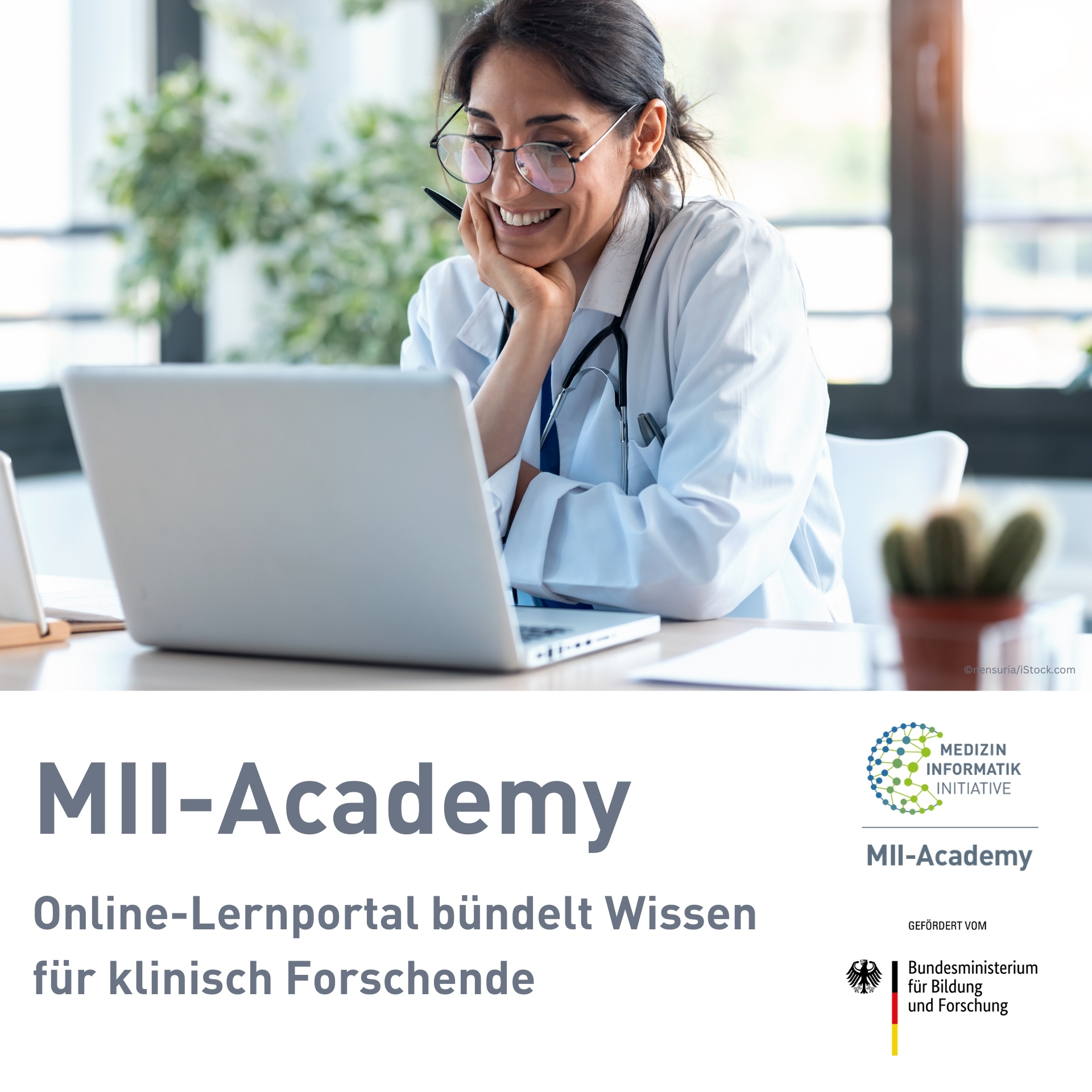Berlin, 08/04/2024. The Medical Informatics Initiative (MII), funded by the German Federal Ministry of Education and Research, has established structures and processes to make healthcare data accessible for research. These infrastructures represent considerable added value for clinical researchers. With the online learning platform "MII-Academy", the MII supports clinical researchers in using the opportunities created for their own projects in a targeted manner. In video-based learning units, researchers learn how to apply for and analyse medical data for their research project. The learning platform is now available online.
The Medical Informatics Initiative (MII) and the associated establishment of Data Integration Centres (DIC) at (university) hospitals are creating new opportunities to use routine healthcare data for research purposes across disciplines and locations. The tasks of the DIC include the transfer of data from various data-providing systems, the consolidation and processing of this data as well as ensuring data quality and data protection. The processed data is then made available for medical research. Based on the data volumes obtained, research with clinical care data can help to identify diseases more precisely and optimise patient care.
MII-Academy creates knowledge transfer
The aim of the MII-Academy is to raise awareness of the structures and opportunities created in the MII and to support clinical researchers in using them. This complements other supporting measures such as the call for proposals for data use projects and general offers for the public. The online learning platform uses video tutorials to provide practical background knowledge and recommendations on the services and usage processes of the MII. Based on the experience of the SMITH Academy, which was developed in the SMITH consortium during the first funding period of the MII (2018-2022), the MII-Academy follows a modular concept. The modules are divided into four main topics: Overview, Basic knowledge to support in-house research, Advanced methods of data analysis and Special topics of data preparation and analysis. The topics build on each other, increasing in complexity step by step. Users can determine the order in which they work through the topics according to their own level of knowledge and repeat modules several times, regardless of time and place.
„With the MII-Academy, we teach doctors and researchers how to use the MII infrastructure to answer innovative medical research questions with routine data from patient care, i.e. real world data," explains Prof. Dr. Toralf Kirsten, Professor of Medical Data Science at Leipzig University, who was in charge of developing the MII-Academy concept.
Continuous expansion and ongoing updates are planned
The MII-Academy will be continuously expanded and improved by contributions from MII stakeholders in order to provide a comprehensive range of content that meets the needs of clinical researchers. Currently, there is an initial selection of videos and topics at each level of the learning platform. New learning materials are constantly being developed to increase the variety of topics available. Self-tests are also being planned to help participants deepen their understanding and check their knowledge independently. There are also plans to set up regular online consultation hours. This will give users the opportunity to ask questions about the content and discuss specific problems. The MII-Academy sees itself as a comprehensive support service and is accessible to all interested parties without participation restrictions. The learning platform is operated by the University of Leipzig and is closely integrated into the MII's other training and advisory activities.
Further information and access to the MII-Academy can be found at: https://www.medizininformatik-initiative.de/en/consortia/mii-academy.
Press contact:
Sophie Haderer
Phone: +49 30 22 00 24 7-32
Mobile: +49 173 4054214
Email: presse@medizininformatik-initiative.de
Background information on the MII:
The aim of the MII is to digitally network routine data from patient care throughout Germany and make it available for medical research in order to treat diseases faster and more effectively in the future. All of Germany's university medical centres are working on this together with non-university hospitals, research institutions, companies, health insurance companies and patient representatives in the four consortia DIFUTURE, HiGHmed, MIRACUM and SMITH. The Federal Ministry of Education and Research (BMBF) is funding the MII with a total of over 480 million euros up to and including 2026. Data protection and data security are top priorities.
The MII has been building data infrastructures at university hospitals since 2018. The MII partners have already demonstrated the benefits of their IT solutions in practice using a wide range of use cases - from intensive care to oncology. The focus of the consolidation and extension phase (2023-2026) is on extended collaboration between the university hospitals and their cooperation with new partners, particularly from regional healthcare.
An important component of this infrastructure is the German Portal for Medical Research Data (FDGP). It is intended to serve not only MII partners, but also all researchers as a central point of contact if they want to use data and biosamples from university medicine. The FDPG is also aimed at the general public. It makes transparent which projects are conducting research with patient data and what results have emerged.
In addition, the BMBF is funding six "Digital Hubs: Advances in Research and Health Care” (2021-2025) as part of the MII. Their task (initially in pilot projects) is to integrate the pioneering work of the university hospitals into other areas of the healthcare system: from outpatient care in practices to rehabilitation and aftercare. To strengthen research and teaching in the field of digital health, the BMBF is also supporting newly established professorships with a total of 21 junior research groups (2020-2026).
A coordination office is responsible for the national coordination of developments within the MII, which is operated by the TMF (Technology, Methods and Infrastructure for Networked Medical Research) together with the MFT (German Association of Medical Faculties) and VUD (German Association of Academic Medical Centres) in Berlin.
To the online learning platform "MII-Academy":
https://www.medizininformatik-initiative.de/en/consortia/mii-academy
https://www.smith.care/en/education/mii-academy/


